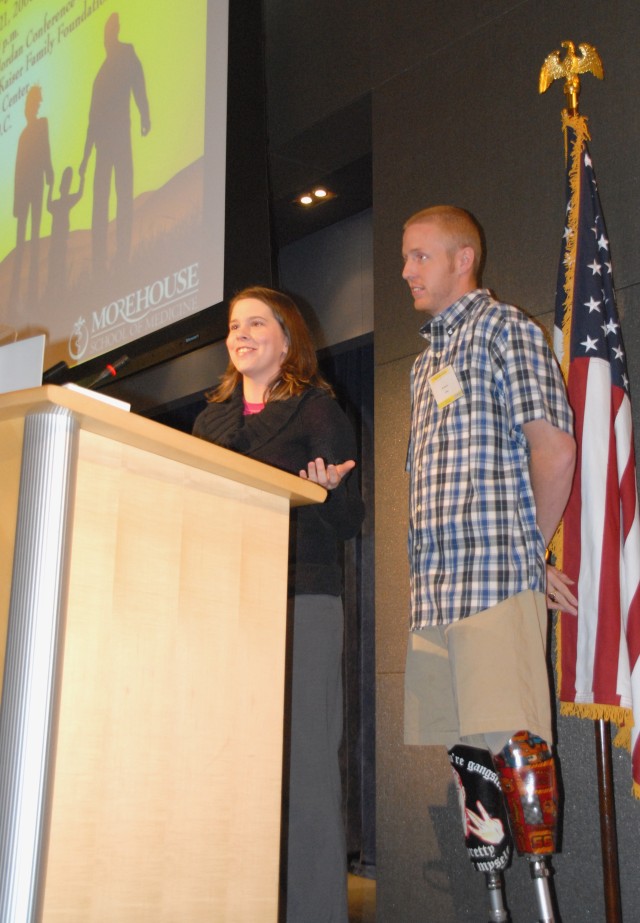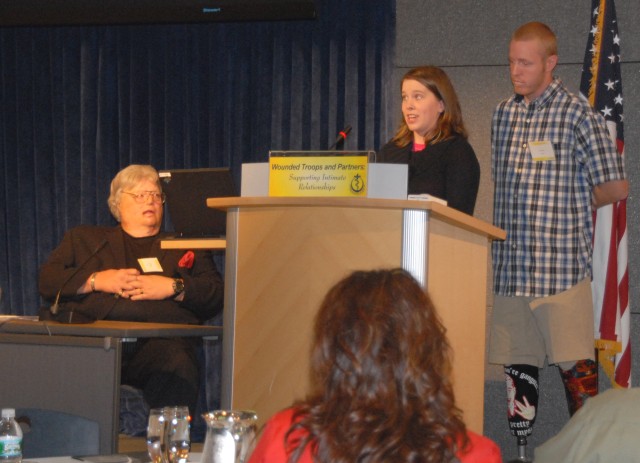WASHINGTON (Army News Service, May 23, 2008) - When Soldiers return from war with catastrophic injuries, one of their biggest worries is how their spouses and significant others will react.
Veterans and medical experts discussed romantic relationships during the Morehouse School of Medicine's "Wounded Troops and Partners: Supporting Intimate Relationships" conference here Wednesday.
"I instantly realized when I woke up and saw my wife there that I wouldn't have to go it alone. I was 22 years old. We had two young daughters. You think, 'wow, I'm different. Is my wife going to love me for who I am' Am I going to be accepted by my friends how I am'" retired Spc. B.J. Jackson of the Iowa National Guard said of waking up at Brooke Army Medical Center after he lost both legs and was severely burned by a land mine in Iraq.
He and his wife Abby spoke candidly about how it was a struggle at first for their relationship to return to normal as he healed.
Between his injuries, post-traumatic stress disorder and various medications, her husband just didn't seem interested in her as a woman, Abby said, and all she wanted was her husband back. The hospital environment didn't encourage intimacy or privacy and Abby didn't know if she was even allowed to climb in her husband's bed to hold him.
Jackson's doctor wasn't much help either. When Abby asked about their physical relationship, or lack thereof, he said was it would come in time, but didn't offer any advice or suggestions.
Dr. Lance Goetz, a physician at the Dallas VA Spinal Cord Injury Center, said that as many as 50 to 60 percent of Soldiers returning with traumatic brain injuries have problems or concerns with regaining intimacy. Even minor brain injuries can have effects on physical and emotional relationships, he said. Various medications, pain and injuries, altered body image and lowered self-esteem can all lead to a lack of interest in intimacy, he said. So can a fear of rejection, leading Soldiers to push their spouses or significant others away.
"There's an automatic, almost, rejection for the Soldiers for themselves so they put off that rejection toward the spouse or girlfriend or significant other," said Abby. "They're not sure how to adapt to that themselves. 'Are you rejecting me because I'm rejecting myself' What exactly is going on''
"I think a lot of young people get so wrapped up in it that they're like, 'Look there's nothing. I look good. I've got both my legs. I'm going to go get me a man. Forget you.' And I think that happens all too quickly and too often. You've got to look at the statistics and reality: very young people do think that way and they operate on that level and that's what ends up happening. And you're left with the Soldier who's in the bed by himself thinking 'great, that was what was going to happen.' So communication is the key."
Doctors and mental-health professionals, especially those employed by the military and the Department of Veterans Affairs, have a responsibility to help their patients to return to as many normal, everyday activities as possible, including healthy sexual activity, said Goetz, so they can't be afraid to address this topic and shouldn't wait for their patients to bring it up. "Shame on us if we don't," he said.
There are therapies, suggestions and medications doctors can prescribe to help Soldiers and their partners, he said, and most men with injuries can still father children.
The Jacksons did figure it out, and much to the amazement of members of Jackson's unit have added two sons to their family; but with assistance from medical professionals, they say their lives could have been a lot easier.
Intimacy helps keep couples together and experts agreed that a strong support system is essential in helping Soldiers recover, especially those with TBI and psychological disorders.
"It truly is your wife who gets you through it or your loved ones or your friends. My kids were a big part of my recovery," said Jackson, adding he feels terrible for single Soldiers who didn't have anyone to depend on. One friend asked him how he was supposed to meet women when he was missing a leg.
And when Soldiers receive that "Dear John" letter, they are at a far greater risk for suicide, so it is vital to help families and partners stay together, said Dr. Harold Wain, chief of the psychiatry consultation liaison service at Walter Reed Army Medical Center. Doctors and mental-health experts, he continued, should do whatever possible to help Soldiers feel whole and human again-including letting their spouses sleep in their hospital beds.
The Army, then, also has to make sure couples have a strong foundation before deployments and emphasize the vows they made to stay together in sickness and in health, said Lt. Col. Peter Frederich, family ministries officer at the Office of the Chief of Chaplains.
The military also cannot dismiss topics because they're too hard or risky, concluded Brig. Gen. Loree Sutton, M.D., special assistant to the assistant secretary of defense for psychological health and traumatic brain injury and the director of the DOD Center of Excellence for Psychological Health and Traumatic Brain Injury. "We have the opportunity to talk about things that must be talked about."




Social Sharing